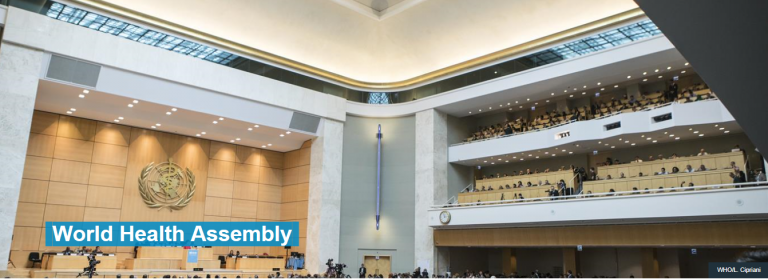The World Health Assembly is the decision-making body of WHO. It is attended by delegations from all WHO Member States and focuses on a specific health agenda prepared by the Executive Board. The main functions of the World Health Assembly are to determine the policies of the Organization, appoint the Director-General, supervise financial policies, and review and approve the proposed programme budget. The Health Assembly is held annually in Geneva, Switzerland.
Find more information here.
The provisional agenda can be found here.
Newborn health related side events:
Title: Every newborn everywhere: closing gaps in neonatal care
Date: Thursday, 23rd May 2019
Venue: Intercontinental Hotel, Geneva
Session Organisers: WHO and the Partnership for Maternal, Newborn and Child Health
Session Objective
To share knowledge and experience for driving progress on newborn health, with special focus on transforming inpatient care of the most vulnerable newborns, those born too small, too soon, and who are acutely ill, particularly in low and middle-income countries and humanitarian settings.
Session Description
This session will provide an overview and vibrant discussion of the new global report, Survive and thrive: transforming care for every small and sick newborn, led by WHO and UNICEF with support from multiple partners including 94 experts from 16 countries. The report focuses on the most vulnerable newborns, including those born too small, too soon, and who are acutely ill. It outlines the global problem, showcases the progress, summarizes what can be done to transform inpatient care for small and sick newborns, and demonstrates the importance of data to guide investment and improve quality and equity. The report contributes to achieving the objectives set out in the Global Strategy for Women’s, Children’s and Adolescents’ Health (2016–2030) and builds on the momentum of Every newborn: an action plan to end preventable deaths. It presents a clear call to action to accelerate progress towards the SDGs to ensure every newborn has the chance to live a healthy and productive life.
As part of identifying the magnitude of the problem, UNICEF and WHO will share the new global estimates of LBW infants and the findings of the Every Newborn Progress Report 2019.
This session will examine (a) the global magnitude of the problem and need for high quality inpatient newborn care in order to achieve global Sustainable Development Goals; (b) the importance of equipping health workers to care for small and sick newborns including through family centerd care as well as nurturing and developmentally supportive care; (c) the need to invest in data, innovation and research to accelerate change; and (d) actions that stakeholders must take to advance the global agenda for small and sick newborn care, including in humanitarian settings. It will showcase some of the case studies presented in the report through a lively “talk show” style panel discussion focusing on key actions required by the different stakeholder groups.
Additional newborn health related sessions of interest at WHA
Title: UHC to deliver the Global Strategy: Rethinking quality midwifery education
Date: Monday, 20 May
Title: High level briefing on aligning women’s, children’s and adolescents’ health and well-being in humanitarian and fragile settings in the context of UHC
Date: Tuesday, 21 May
Title: Leaving no one behind on the road to UHC: where are women, children and adolescents
Date: Thursday, 23 May
